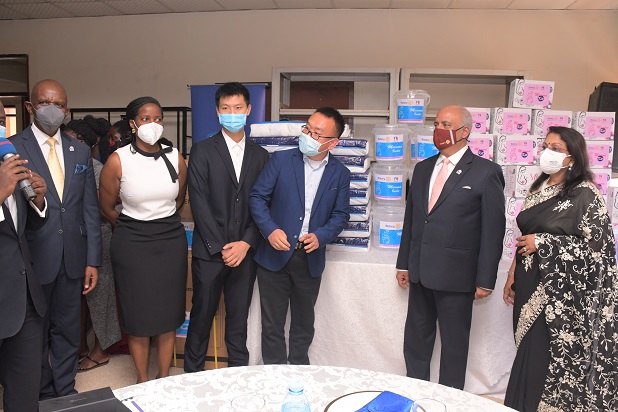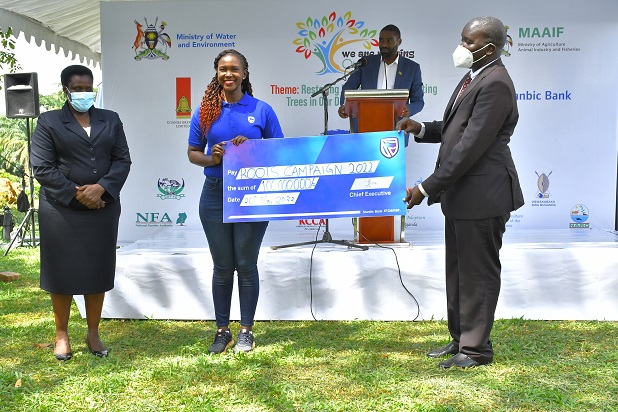Stanbic Bank Uganda’s Maternal Health Campaign dubbed “Every Mother Counts” has received a big boost from Rotary International, Serve to Change Lives and other partners through a new programme.
The multi-partner Maternal, and Child Health (MCH) programme is dubbed “saving mothers and children together” comes to reinforce the attainment of global maternal and child health goal at local levels.
It will focus on five main areas including, empowering adolescent girls and young women, supporting antenatal care, delivering and postnatal care, enhancing capacity and motivation of MCH workers, enhancing advocacy through awareness creation for communities and infrastructure development/rehabilitation.
Together, the partners have also donated mama kits, oxygen concentrators, diapers/pampers, laryngoscopes-neonatal blades and other items to Kawempe National Referral Hospital on Sept.14.
Kawempe Referral Hospital was chosen as a focal beginning point because the facility has been grappling with high patient numbers and mortality deaths.
The Hospital receives over 4000 pregnant women a month from all parts of the country and delivers an average of 100 babies daily.
The hospital had the highest number of maternal deaths at 116, followed by Hoima (46), Masaka (38), Fort Portal (37) and Mbale RRH (33) according to the 2019/2020 Annual Health Sector Performance Report.
Speaking at the handover event for the MCH programme items, at Kawempe National Referral Hospital, Stanbic Bank Uganda Chief Executive, Anne Juuko said, increasing the maternal survival rate is an important goal for the community because it shows that they are addressing the one thing that binds communities together.
“This program complements Stanbic Bank’s ongoing Maternal Health campaign currently running under the theme ‘Every Mother Counts’ where, alongside our partners, we are contributing money and items to deal with the maternal health challenge,” Juuko said.
The MCH program is expected to contribute to the new target of the Sustainable Development Goal 3 (SDG3) to accelerate the decline of maternal mortality by 2030.
Rotary International President, RIP Shekhar Metha, said Maternal and Child Health is one of the seven areas of focus of Rotary international.
Metha said, this program will be run by Rotary District 9213, which is already implementing a multi-year Maternal and Child program in the vulnerable communities of Uganda whose situation has been aggravated by the aftermath of the COVID-19 pandemic.
Ultimately, the successful implementation of the program is anticipated to decrease unplanned pregnancies and increase antenatal attendance; reduce maternal and new-born mortality as well as severe morbidity, reduce perinatal and child mortality.
Implementation strategy
The project planned interventions will be implemented through partnerships and collaborations between the different key stakeholders using existing Rotary structures.
The planned outputs will be achieved through the strategic integration of the MCH programme activities into several ongoing closely related Rotary and government programmes.
All these interventions will be guided with evidence obtained from strong operational and patient centered research and innovation which could be supported through Rotary Clubs in Rotary District 9213.
Health Minister, Dr. Jane Ruth Aceng welcomed the programmes and said: “We are sure that this intervention will provide clean and safe delivery to our mothers at Kawempe Referral Hospital especially at this critical time when the country is battling the COVID-19 pandemic.”
Uganda’s rosy numbers
Uganda continues to make remarkable progress in improving the health of women and children.
The Maternal Mortality Ratio (MMR) for women aged 15-49 has slightly improved from 438 deaths per 100,000 live births in 2011 to 336 deaths per 100,000 live births in 2016, according to Uganda Bureau of Statistics latest data.
Regardless of the slight improvement, the mortality of mothers is still unacceptably high with one woman out of every 49 women dying from maternal complication related to pregnancy or delivery.
While approximately 300 new-borns and infants and 20 mothers die from preventable causes daily, in Uganda (UBOS, 2017). The leading causes of maternal mortality are postpartum haemorrhage which contributes 36%, hypertensive disorders in pregnancy which contributes 13% and Sepsis which contributes 10%.





